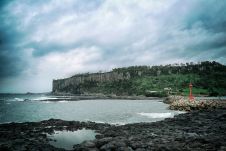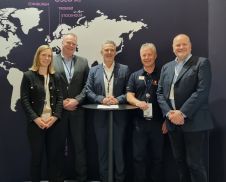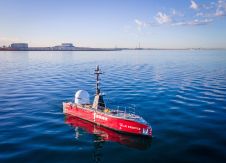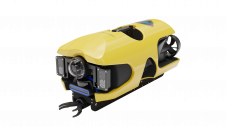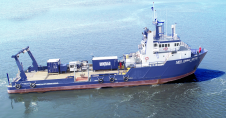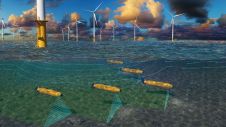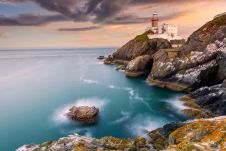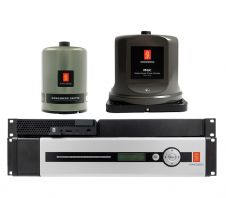The Winners Are…
Six Candidates So Far
Every five years an International Hydrographic Conference (IHC) of all Member States (at present 77) of the International Hydrographic Organisation (IHO), represented by their Hydrographers, convenes in Monaco to elect a new Directing Committee, a president and two directors for its International Hydrographic Bureau (IHB).
The IHC will this year be held from 7th to 11th May 2007 at the Auditor–ium ‘Rainier III’ in Monaco, together with Hydrographic Industry and IHO Chart exhibitions. As of early March, six names had been put forward for the canditature. Nomination by the governments of their respective countries is such an honour that all the candidates should be considered winners already!
As a conventional interview of the candidates might favour those being asked the most popular questions, while the same questions put to all could result in nine similar answers and thus less than interesting reading, we invited candidates to contribute to a freestyle interview. Each was asked to write a short piece entirely at their own discretion but opening with some biographical details. Unfortunately, space restrictions meant that we had to limit each contributor to 245 words. Whilst IHC candidates may be nominated up until ten days before Conference, Hydro international also had to set a closing date for interview contributions. So that, although unlikely, the names of other candidates may have been put forward by the time Conference opens.
Our thanks are due to the present candidates for their enthusiastic response to our invitation. Going on these tremendously strong presentations we predict a tough race in Monaco and wish them all the very best!
The Candidates
Candidate contributions appear in alphabetical order.
• Commodore (retd) Nigerian Navy Joseph O. Abulu, Nigeria; Former
Nigerian Hydrographer
• Captain (retd) Chilean Navy, Hugo M. Gorziglia, Chile; Direct–or
IHB and former Chilean Hydrographer
• Commander (retd) Royal Norwegian Navy, Frode Klepsvik, Norway;
Director, Norwegian Hydrographic Service
• Vice Admiral Hellenic Navy, Alexandros Maratos, Greece; President
IHB and former Hellenic Hydrographer
• Dr Hideo Nishida, Japan; Executive Director Japan Hydrographic
Association and former Japanese Hydrographer
• Captain Australian Navy, Robert E. Ward, Australia; Deputy
Hydrog–rapher of Australia
Commodore (retd) Joseph O. Abulu
I joined the Navy in 1973 after graduating with a BSc in Geography. I was then trained in Basic Hydrography in India and in Hydrographic Engineering, Oceanography and Marine Environment in NAVOCEANO, USA in 1976. I went on to command the Nigerian Navy Hydrographic ship before being appointed Hydrographer of the Navy, a post I held from 1986 to 1991. I also held various military and administrative appointments before retiring in 1996.
As Hydrographer I laid down a blueprint for the development of Hydrography in Nigeria and co-ordinated formation of the Nigerian Hydrographic Society. I actively promoted sustainable Maritime Environment polices, culminating in the establishment of a National Oil Spill Contingency Plan for the country.
I also, for the first time, represented Nigeria at the IHO conference and participated actively by chairing the Eastern Atlantic Hydrographic Conference (EAtCH). I later hosted the first EAtCH conference to be held in Africa in 1991.
The IHO should be a catalyst in changing African and Third World government attitudes to hydrography and the charting of their waters. The IHO may achieve this with more vigour by helping them devise funding strategies.
I believe that my presence at IHB will really enhance this ongoing endeavour for the betterment of hydrography in general, and in charting of the relevant seas.
This is part of the global responsibility of the IHO that my election will help foster; i.e. to make the world seas safer to navigate and promote international commerce. It would be a pleasure to be part of this success story in the years ahead.
Captain (retd) Hugo M. Gorziglia
Commissioned a Navy Officer in 1970, Captain Gorziglia earned his Hydrographic Engineer Diploma in 1975 and served at the Chilean Navy Hydrographic and Oceanographic Service (SHOA) as head of the Hydrographic and Cartographic Departments, technical advisor and deputy director. In 1994 he was appointed director, leading development and modernisation at SHOA. In 1998, after his retirement, he continued at SHOA as advisor for International Relations. Since his 2002 election as IHB director he has co-ordinated six Regional Hydrographic Commissions, chairing the Hydrographic Committee on Antarctica. He has also launched several capacity-building initiatives, including establishment of the IHO Capacity Building Committee, of which he is chairman, and the IHO Capacity Building Fund. He is responsible for the IHO Work Programme and its relationship to the budget.
Raising awareness of the importance of hydrography and its contribution to safety of navigation, protection of the marine environment and socio-economic development will continue to require special attention and persistence on the part of the Organisation in the future.
Aggressive and sustainable provisions for capacity building are essential to improve the effectiveness and efficiency of the IHO. It needs to be proactive, ready and willing to respond to new challenges, and open to productive relationships with industry and academia. The success of the proposed new IHO will depend strongly on the commitment of member states, their representatives, and particularly the IHB Directing Committee.
Commander (retd) Frode Klepsvik
I graduated from the Royal Norwegian Naval Academy in 1981 and gained a master’s degree in Nautical Science in 1986 at the University of Trondheim. Over the past twenty years I held several management positions in the Navy and in Det norske Veritas Classification Society, before becoming Norwegian Hydrographer in September 1997. Maritime safety has been the main focus in all these positions, including involvement in IMO, IHO and IEC relating to SOLAS matters in general and ECDIS in particular. Since 1997 I have been active in IHO, presiding over IHO Conference in 2002 and chairing the Strategic Planning Working Group since 2002.
Since its inception IHO has been instrumental in ensuring international standardisation and consistency in the production and dissemination of nautical charts, publications and related services. Unprecedented technological development over recent years has increased the importance of, as well as the challenges facing the Organisation. Supporting the global establishment of adequate hydrographic capacity is one of the main strategic goals. Closely related to this, and also of major importance, is the timely provision of ENCs with adequate global coverage. Furthermore, the increasing need for hydrographic information in Spatial Data Infrastructure Initiatives (SDIs) will require an IHO that proactively pursues new possibilities and solutions.
IHO will manage to adapt to the challenges ahead through a high level of member-state commitment, combined with an ability to work closely with industry and other inter–national organisations. If elected, I will devote myself fully to advancing IHO in meeting these challenges.
Vice Admiral Alexandros Maratos
The XVIth International Hydrographic Conference in 2002 elected me president of the Directing Committee following eight years service as Hydrographer of the Greek Navy. After graduating from the Greek Naval Academy, I obtained a master’s degree in Surveying Engineering from the Technical University of Athens and a master’s in Physical Oceanography from the Naval Post-graduate School, Monterey. I then served for twenty-five years in survey ships, hydrographic and cartographic posts. The IHB has managed over the past five years, I believe, to raise awareness of the importance of hydrography at national, regional and international levels. Achievements have included restructuring of the Organisation, approved during the third EIHC in 2005, co-ordination and support needed for ENC production and the establishment of a Capacity Building Strategy and Fund. There has also been positive co-operation with other organisations, better co-ordination of the Regional Hydrographic Commissions, closer co-operation with the maritime industry and improvements to internal Bureau financial, administrative and technical procedures.
The IHO is at a crucial stage. Challenges facing the new Directing Committee include technical reorganisation, approval of new structure and internal reorganisation of the Bureau. Others are worldwide coverage of ENCs, the need for new and improved standards such as S-100 and S-44, the use of hydrographic data in applications other than safety of navigation, the application of new technologies and more effective support for developing states. I would consider it an honour if member states entrusted me with continuing this work for the next five-years.
Dr Hideo Nishida
I began my more than thirty-year-long hydrographic career as a Japan Coast Guard in 1972. I acquired a rich volume of experience in technical research, including a PhD in Oceanography, hydrographic survey, cartography (the first ENC in the world) and international co-operation, before being appointed Chief Hydrographer of Japan (equivalent to Rear Admiral) in 2000. At present I am working as Special Assistant to the Minister of Foreign Affairs of Japan, executive director of the Japan Hydrographic Association and vice-chair of the SPWG.
As a candidate for the directorship of the IHB I have made three commitments. Firstly, ENCs are currently facing serious problems, such as insufficient coverage, spread of unauthorised quasi-ENCs, and premature specifications. These problems are giving ENCs the reputation of being non-user-friendly and thus detrimental to navigational safety. I will use my technical and co-ordination skills to improve the convenience of ENCs worldwide.
Secondly, in order to raise the IHO’s profile worldwide it must meet the needs of its member states, other international organisations such as the IMO, and general users. I will continue in my efforts to overhaul the IHO through my outstanding aptitude for organisational management, and will raise its international profile.
Thirdly, I have been involved in Japan’s international co-operation projects, that have produced more than three hundred hydrographers from thirty countries, and have also established hydrographic units in countries that until recently did not have any such. I will improve hydrographic capabilities worldwide with the full support of the Japanese government.
Captain Robert E. Ward
I have carried out hydrographic and oceanographic surveys in many parts of the world. My last sea posting was in command of the surveying ship HMAS Moresby. Ashore, my experience includes strategic planning, capability development, project management, commercial support programmes, hydrographic training, personnel management, and hydrographic data licensing and associated legal issues. I am Deputy Hydrographer of Australia, with special responsibility for Australia’s national and international hydrographic relations. I have been actively involved in a wide range of IHO activity for more than a decade and am currently chairman of the IHO CHRIS.
I want to see the IHB continue in its efforts to ensure the best possible co-ordination of IHO activities and thereby harness the wide experience of its member states. I would like to see the active participation of more HOs so that the IHO can fulfil its primary aim, which is the bringing together of HOs for the benefit of mariners, the environment and the wider community.
My driving vision continues to be to encourage co-operation and sharing of experience, especially at regional level. This is particularly important in the less well developed hydrographic regions, where HOs may presently feel excluded or inhibited from participating in IHO activities. I also believe the IHB must continue in its efforts to tackle the most influential and pressing issues, including electronic charting, the wider use of hydrographic data, and closer co-operation with industry and sister organisations.

Value staying current with hydrography?
Stay on the map with our expertly curated newsletters.
We provide educational insights, industry updates, and inspiring stories from the world of hydrography to help you learn, grow, and navigate your field with confidence. Don't miss out - subscribe today and ensure you're always informed, educated, and inspired by the latest in hydrographic technology and research.
Choose your newsletter(s)












